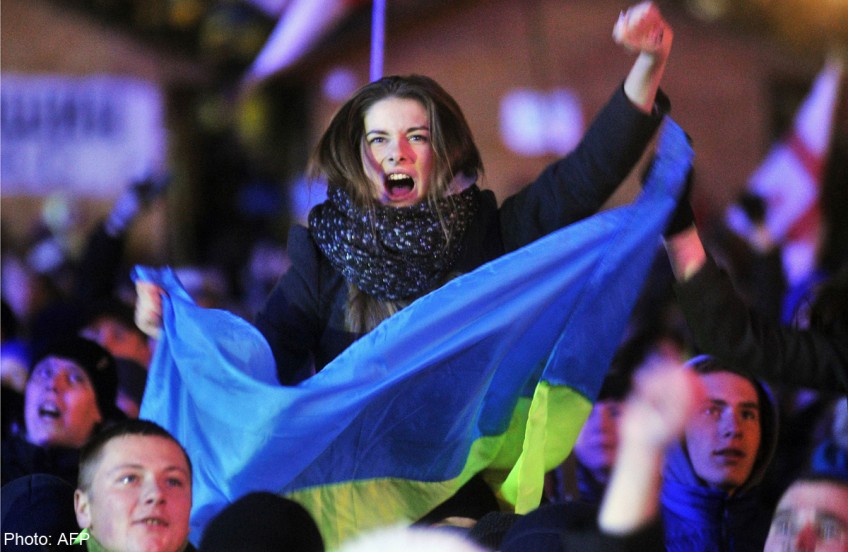Internal rift within Ukraine set to widen

UKRAINE- Thousands of protesters continue to besiege government buildings in Ukraine, as anger at its President's decision to ditch a deal on free trade and political ties with the European Union in favour of closer links with Russia grips large parts of this former Soviet nation.
While Ukrainian President Viktor Yanukovych, who has been in power since 2010 and continues to enjoy the backing of wealthy businessmen and the security services, is not under immediate threat, his decision to turn Ukraine away from Europe, effectively consigning it to a Russian sphere of influence, is expected to aggravate an internal divide within his country.
Despite its vast territory and 45 million people with an ancient culture and language, Ukraine had no independent existence as a state until the Soviet Union disintegrated in 1991. Up to a third of Ukrainians continue to speak Russian as their mother tongue and regard Russia as their ultimate protector.
This division is not only linguistic, but also territorial. Russian speakers are concentrated in the eastern part of the country, while in western Ukraine, which used to be part of the Austrian-Hungarian empire, most people are ardent nationalists who detest Russia and see Ukraine as part of the West.
Ukraine's balancing act between these two irreconcilable parts is made more difficult by Russia. No Russian leader has ever accepted that Ukraine, which Russians regard as the cradle of their civilisation, is lost for ever; the assumption in Moscow is Ukrainian independence remains a temporary phenomenon which Moscow can reverse by supporting pro-Russian domestic politicians.
Mr Yanukovych, who hails from eastern Ukraine, was always Russia's preferred leader, especially since one of his first acts upon winning power was to jail Yulia Tymoshenko, his rival and Ukraine's most famous pro-Western leader, on charges of corruption.
Still, when earlier this year the European Union touted its new "Eastern Partnership" idea to Ukraine, he showed interest. For, although the offer included no promise of full membership in the EU, it did promise a large measure of free trade and political support. But after dealing with EU negotiators for a while, he sent them packing, opting for an alliance with Russia instead.
The decision was almost entirely influenced by Mr Yanukovych's personal calculations. He faces re-election next year just as the Ukrainian economy is nose-diving. A deal with the EU cannot produce the quick economic benefits he needs; that can come only from Russia, which offered cash and also guaranteed Mr Yanukovych would not have to deal with pesky European election observers on ballot day next year.
Russian President Vladimir Putin is delighted with the outcome, and has instructed his officials to offer Ukraine even more inducements: "No one other than Russia can provide Ukraine with the necessary funds so quickly and in such quantity," boasted Russian Deputy Prime Minister Igor Shuvalov yesterday.
Still, both the Russian and Ukrainian leaders know they are skating on very thin ice. Mr Yanukovych's problem is not so much the size of the anti-government demonstrations, but where these take place: If western Ukraine erupts in violence, that would put an intolerable strain on an existing fissure. The mayor of Lviv, western Ukraine's biggest city, has already warned that local police would take off their uniforms and defend residents if the central government sent troops to crush demonstrators.
Ukraine is also bleeding talent as people emigrate: Its population has shrunk by 10 per cent over the past decade, and the trend will accelerate as young people, who overwhelmingly oppose an alliance with Russia, lose faith in their future prospects.
More importantly, Mr Putin will soon discover that bankrolling Ukraine as he is now pledged to do is not a tenable proposition. Russia is already subsidising Belarus, a neighbouring country which is also in Moscow's sphere of influence. But Belarus' population is less than a quarter that of Ukraine, and Ukraine's economic problems are more intractable.
Although no precise figures are available, economists estimate the Russian promises of aid will cost Moscow at least US$10 billion (S$12.6 billion) yearly, a hefty sum which Russia can afford only if it scales down its own domestic spending. So, in effect, Moscow will be subsidising Ukrainians at the expense of ordinary Russians, not a detail Mr Putin likes to dwell on.
But the biggest fear for all European governments is that, ultimately, Ukraine could turn into a failed state, a country whose leaders are too feeble to rule while the opposition is too weak to take power and Russia is unable to control events. And that is precisely the "wild east" scenario which, when the Cold War ended two decades ago, European leaders promised to avoid.

Get a copy of The Straits Times or go to straitstimes.com for more stories.